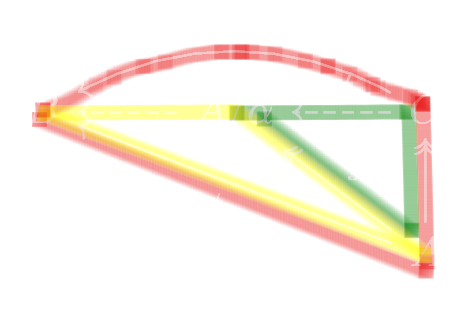II.2.3,3.11acd
5/14/2022
WHAT THE FUCK THO.
WHERE DID LOVE GO?
FIVE
FOUR
THREE
TWO
BREAKIN BROKE BRO
AIMIN AT YA HULL
LIKE A BUFFALO
FUCKS A SIEGE DOE?
UPSIDE DOWN LIMBO
(OOOOHHHHHHH)
NO BREAD BRO NO BRIO’
ALL THE DETAILS
IN THE DEVOLS
GENS KEEP TRACK
O’
NOTHIN’ DOWN LOW ↓
BUT I GOT A PARK
UP IN OL’ OLL’ ↑
(YEEEEEEEEEEEE)
GIT A HAMMAH,
AND THE SICKOLE ☭
IS A HANDSPIKE
FOR THE SKYHOLE
MISS AMERICA
RED TIGHT BLOWHOLE
UNSPIKE THE CANNON
IN THE GUNHOLE
TIME A WASTIN
ON THE GUNROLL
⋅ 2
⋅ 12pdrs
⋅ at 0700hr
⋅ slow stroll
TICK TOCK SHELL SHOCK
HEAR THE GUN BLOW
STEAL A 40KILO AND POUND HER BIRTHHOLE
(AWWWWWWWWWWWWW)
CUCK A NEAPOL,
DESTRESS HIS DAMSOL
SHE GIVES YOU HEAD WHILE HIS HEAD ROLL
STOLEN ON THE CLOCK,
40-KILO
NEO-/POL/ WIFE:
BROWN AND TWELVE YEARS OLD
(WOOOOOOOOOOOOOOOOOOOOOOOOOOOOOOOOOOOOOOOOOOOOOOOOOOOOOOOO)
WHAT THE FUCK THO
WHERE DID LOVE GO?
(OH)
FIVE
FOUR
THREE
TWO
NO AMMO
(SHIIIIIIIIIIIIIIIIIIIIIII)
COMMANDER GHOST HE’S A NO SHOW
HE HINTER I’M FRONT ROW
CANT READ A ROOM CANT READ A MAP
YO.
WEARS A MUSTACHE PAINTS LIKE AN
ART HOE
IM ON THE RAMPART MAPPING OUTPOSTS
I LISTEN TO DESCARTER YOU LISTEN TO
CARTEAUX♩
FIND A FUCCBOW
SHOOT YOUR ARROW
WHITE HOT SHOT
SO HOMO
(AIYAYAIIYAYAYAYIIAAAAAAAAAAAAAAAAAAAAAAAAAAAAAAAAAAAAAAAAAAAAAAAAAAAAAAAAAAAAAAAAAAAAAAAAAAaaaA)
AINT NO CART THO. THEY ALL WAGONS
× GONNA FIB BRO. ITS ALL FIBROE.
THEY ALL NAVAL. ALL CANNONS.
ALL FROM THE WALL TO THE WIND⊗W
WHAT THE FUCKKKKKKKK THO. WHERE THE LOVE GO.
FIVE
FOUR
THREE
TWELVE WAIT WHAT YO—
(OOOOOOOOOOOOOOOOOOOHHHHHHHHHHHHHHHHHH)
GOTTA UPROAR.
GOTTA UPTHROW ✊🏾
GOTTA LIVEDOWN.
GOTTA UPGROW.
ITS ALL NO.
ITS ALL KNOWN.
There’s nothing here....
but outgrowth.
WHAT THE FUCK YO.
WHERE DID LOVE GO.
CANT BUY IT BABE.
NO BREAD,
NO DOUGH
THE STORES CLOSE
THE SCHEMES CLOSED
ARREARS CLOSE LOW
(AAAAAAAAAAAAAAAAAAAAAAAAAAAAAAAAAAAAAAAAAAAAAAAAAAAAAAAAAAAAAAAAAAAAAAAAAAAAAAAAAAAAAAAAAAAAAAAAAAAAAAAAAAAAAAAA)
AND YOU SELL LOW
what’s that? Closed subschemes? Ooh, is that foundational? Passed over while
scurrying about the field? Lol. Which ones the devil? You got an eye for that? An
eye for the devil? I’ll need a damn good chief of staff, man. You know:
Someone to run shit, on behalf of someone else. That’s what I’m missing: A
master of administration. I need a head-and-chain to carry around with me.
I’ll need a bit more brain space. I need a human being to park mental
information into. Who wants to be the ”mental reserve” for someone else? How
degrading, they say. But this is how magic is made. Cooperation, and
devotion. You know what I need? A pastor with a big, fat Qari memory at
one’s side. the A Berthierian wonder. An Admax of an Admin. An admin
cum general-on-call. Someone jussssst a tad shorter than me–an inch
or two. A dirt-eater, who snuffs out maps with debris. Someone that is
coordinated with me, you see. We need to be able to dance, and he needs to
know the steps. And he needs to keep the steps confidential. He needs to
finish my sentences like a wife. He needs to be connected to my brain in
invisible threads. His motor functions should respond to my movements and
vice-versa–we need to move in messy synchronization. Get you a good wife:
Can you? One who’ll present your amendment with the force of their
good image. One that’ll pretie your ties and have breakfast ready by the
time you’re down to dine. One that’ll keep refilling your coffee like an
IHOP waitress. One that’ll watch you bite deep into a barbeque sauce
smothered steak, your mouth-half-open chewing, and be at the ready with a
napkin to wipe your lips. One that’ll entertain your guests, make em feel
like home. One that’ll make em feel like she’s their wife, or two. She can
remember names and faces even better than you. Make em feel good.
Butter em up. Feed you thickly buttered waffles while you’re looking
down at a map, or two. Be the liason tween you and your men–be your
guard, the intermediary at the front desk. The preview; the pre-you. A
woman can’t do any of that. Not two, not three. You’ll need a young man.
Because he’ll need to be your notes; read books on your behalf–read: not
just ”read books”, but read them as if you, the infamous non-reader,
were reading them. He’ll need to vice you, and thus be malebrained. Have
man-to-men with your underlings, and be able smooth-talk a vicomtesse.
Act like a boyish son to a septuagenarian superior and a firebrand to a
septuagenarian enemy. He’ll need to be able to run the show when you’re off
in the East, without stealing it. Yes: All his intrigue should be directed
away from you, outward from you, spun out from your person like the
webs of a moth. Can you
find someone that can be you, in all but optics. Can someone be your
copy, but not in your image? Is that a thing? Cause that’s what I need.
Someone who is me in everything except where it counts: On the ballot.
I need that sort of loyalty. The one who’ll kiss my dick under a desk.
4.4: Prelude
The original intention of this post was to solve this:

In trying to do so, I got thrown into a journey of administrative overhead that is
now ballooning into something else entirely. This turn of events has been so
bizarre, in fact, we may even make it to section 5. So let’s begin with
section 2:
2.3
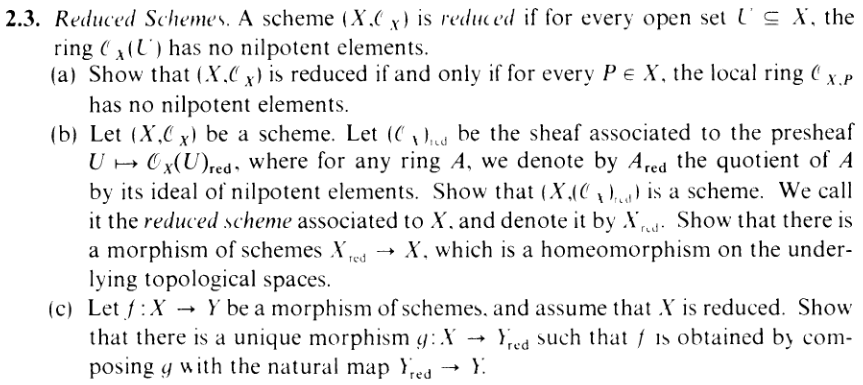
EQHIORWQORHIWQORIJWQOIRHQWIHRWQ0IHRQ0WHJR0WQHRJ0WQHJR0WQHJR0WQHJRWQHJRWQIHROQWIHROIWQHROIWQHROIQHRWOIQWHROIWQHOIHQRWOIHJWQORIHJWQOIRHQORHWQOIHROIQHJROIWQHROIWQHROIWQHROWQIHROIQWHROIWQJOIRHJOIWQHOIWQHOIRWQHJOIWQHTOIQHTOIWQHOIHQOIHJRWQOIWHJQOIHJWQROIHWQOIHJWRQOIQHJORIWQJHOIWQHJROIWQHROIWQHROIWQRJOWJEQOJEWQOIJEWQOIJEWQOIJEWQJOIEWQJOIEWQJOIEWQEOIJWQOIJEWQOIJEWQOJIEWQOJIWQEOJIEWQOJIEWQJOWQEJOIWQJOWQJOIWQJEOWQIJEOQIWJEOWIQJEOIWQJEOWIQJEOIWQJEOWQJEOIWQJEOIWQJEOWQIJEOWIQJEOQWJEOIWQJEOWQJEOIWQJEOQWJEOIWQJEOIQHROIJREOIWQHJREOIWQHJROIJROIWQHJREOIWQHJROIWQHJROIHJRWOIHWQOIHJRWQOIHJRWQOIHRWQOIHJRWQOIHWQHOIWQOIHJWQIHJORWOHIWQOIHWQOIHWQOIHRWOIHRWQHOIRWQOIHJRWQOIHRWQOIHRWQOIHJRWQOIHJRWQOIHJRWQOWIRQOIHJWQROIHEWQJOIWQOIJWQHOHQWROIHRWQRHOIWQHQWRWQPRIQWOURWQUROWUQROWQUJORWQUJORWQJUORWQIORQWRWQJROWRIWOQQIOWQUEOWWQUWUUWQRQUIJROWQUEOWQQIUEWOURWQOUEOWQUROWQURWQWQUWQIUROUEWWUWQROIEWOQURIOWQUROWQIREOWQURIOQUROWQWQUROWQIUROWQUEOWQRIUOWQIUREOWQRUOWQEUJOWQRWQQJU
A

By the way, why restrict the term ”reduced” to schemes? Why not also talk about
”reduced sheaves” and ”reduced rings” with the obvious definitions. With that
terminology, this part asks us to prove
X reduced ⇔ ∀P ∈ X : 𝒪X,P reduced
So let’s start with...
0.0.1 only if
Let X be reduced, and let P ∈ X. Let U = SpecA be an open affine
neighborhood of P in X. Then 𝒪X(U) = A is reduced. We want to show that
𝒪X,P = AP is reduced. Now suppose we had a nilpotent element in AP. i.e.
suppose we had
 | ∈ AP | ||
with(
 )n )n | = 0 |
for some n > 0. Then, by the definition of localization, there is some s′
 P such
that
P such
that
| s′(xn − sn ⋅ 0) | = 0 | ||
 s′⋅ xn s′⋅ xn | = 0 | ||
 (s′)n ⋅ xn (s′)n ⋅ xn | = 0 | ||
 (s′⋅ x)n (s′⋅ x)n | = 0 | ||
 s′⋅ x s′⋅ x | = 0 |
That last equality follows from the fact that A is reduced.
UH OH! WE’RE STUCK, HOLY-HEART!!! AP AINT NECESSARILY NO
INTEGRAL DOMAIN. I CANT USE THE ZERO PRODUCT PROPERTY.
WHAT DO? WHAT DO? PANIC PANIC PANIC. Calm down: We’re
still in AP, not A, remember? s′
 P, remember?If s′x = 0, then..
P, remember?If s′x = 0, then..
| (1∕s′) ⋅ s′x | = 0 | ||
 x x | = 0 | ||
 x∕s x∕s | = 0 |
And there she is
0.0.2 if
Now we suppose that 𝒪X,P is reduced for all P. I’ll perform is a sheaf-theoretic
argument–no affines necessary: Suppose U is open in X, and let x ∈𝒪X(U)
such that xn = 0. Note that to say that each stalk is reduced, gives us that for
each P ∈ U, there is a neighborhood V of P such that 𝒪X(V ) is reduced.
Consider the restriction map ρ from U to V . Then
| xn | = 0 | ||
 ρ(xn) ρ(xn) | = 0 | ||
 (ρ(x))n (ρ(x))n | = 0 | ||
 ρ(x) ρ(x) | = 0 |
The last equality following from reducedness. But since x is locally 0, it’s 0
everywhere. Done.
B

This is extremely trivial, because it is simply the map
 |
𝒩 =
 , by the way, is what we know as the nilradical.
, by the way, is what we know as the nilradical.
C
Where X is reduced. Which, dropping down to affines and flipping over to
algebra, corresponds to
where A is reduced. Of course, this forces the definition of g as
| g : Bred → A | ||
[b]
 f(b) f(b) |
So if g exists, it is unique. To show that it does exist, we have to check that the
forced definition is well-defined. If [b] = [b′] in Bred = B∕
 , then
, then
| b − b′ | ∈
 | |||||
 ∃n > 0 : (b − b′)n ∃n > 0 : (b − b′)n | = 0 | |||||
 f(b − b′)n f(b − b′)n | = 0 | |||||
 f(b − b′) f(b − b′) | = 0 | (since A is reduced) | ||||
 f(b) f(b) | = f(b′) | |||||
 g([b]) g([b]) | = g([b′]) |
Done.
3.11
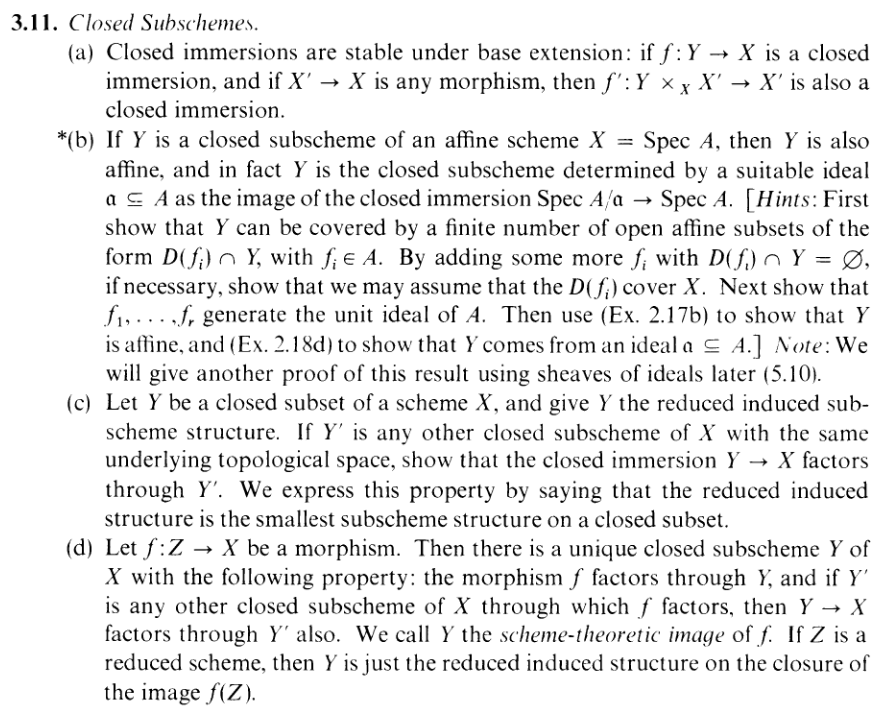
Closed subschemes are a bit more iffy that open ones.

There is crucial fact we handled in an earlier exercise, which Hartshorne
doesn’t bring up here. That, for affine schemes, closed immersions
correspond to surjective ring
morphisms. So, as you’d expect, reducing to affines and getting surjectivity in
algebraworld will be our primary method for showing that something is a closed
immersion. And thus, a lemma:
Lemma: Closed immersions is a local property
Given f : Y → X a closed immersion, suppose Y = ⋃ iV i is an open cover of Y , and X = ⋃ Ui is an open cover of X with V i ⊂ Ui. Then if each restriction of fi : V i → Ui is a closed immersion, then f is a closed immersion
Proof
The surjectivity property on the ”sheaf side” of things is trivial, because in that
case we’ve already shown that surjectivity is local. So we are done as long as we
show that a continuous map of spaces f : X → Y is closed if it is locally closed.
Let’s begin: If f is locally closed on the open cover X = ⋃
iUi, let C ⊂ X be a
closed set. Then
| f(C) | = f(C ∩ X) | ||
| = f(C ∩⋃ iUi) | |||
| = f(⋃ iC ∩ Ui) | |||
| = ⋃ if(C ∩ Ui) | |||
And here’s where the story ends. Someone shoot me.Those 4 lines you see
above is all I had for 4 entire days. 4 entire days were spent musing over
those 4 lines. Count the beats: Bru-tal-ly-stumped. Stuck in a 4/4, all
the way up to 5/5, upon which I ”assumed” it and tried moving on–but
couldnt properly handle 4.4: I ran into more ”glueing” problems along
the way, and if I can assume closed maps glue, well, why can’t I assume
everything glues? That’s a dangerous assumption. After all, separated
morphisms don’t glue, for instance. That’s a fairly big counterexample for
the section named ”Separated and Proper Morphisms.” So in trying to
”move on,” the ass-sucking ghost of this lemma kept coming back to
haunt me, and I kept getting drawn back to it, and getting restuck on it,
and this continued for a week while ive been caught in other tasks. From
5/5 to 5/10, I was stuck in an odd waltz, drawn repeatedly back to this
atrocity. My first obstacle in getting to 4.4 was... this. Not algebra, not
geometry, but basic topology. ”But the union might be infinite, therefore not
necessarily closed!” I wanted to tackle a greater problem, but I’m stuck
with administrative bullshit within administrative bullshit. I hate this
lemma. Just make it end please. i can’t take this anymore. Help.... Please, for the love of God, give me an
admin assistant. I just want someone to take care of me at this point. This
is frustrating and I’m tired of working. I can’t do it. I give up. I I just
want someone to treat me like a child for a week. I’m not joking. Just do
everything for me for a week or two and let me relax, make me relax. Handle
this stupid, dirty work. Take care of my stupid finances. God. Someone
handle me right now. Please, someone princess-carry me to bed. I’m serious. I can’t
take this anymore. Just for a week, please. Maybe 2 weeks. Feed me soup
and tuck me in. At least kiss my peni Anyway, here’s a proof I don’t
undertand.
QED
A

By the way, is it comical that I skipped such a ”fundamental” exercise? My head
is all over the place: Hartshorne rarely gives us the forest, only the trees. So we
shall work on tree-to-tree basis.
We want to show that if f is a closed immersion, then f′ is a closed immersion.
With our lemma 0.0.2 proven, all in 2 can be assumed to be affine, thus giving us
a contravariant algebraic diagram:
The problem now reduces to showing that if f is surjective, then f′ is
surjective. Since f(A) = B, by definition of p1 we have
| {b ⊗ 1|b ∈ B} | = p1(B) | ||
| = p1(f(A)) | |||
| = (p1 ∘ f)(A) | |||
| = (f′∘ g)(A) | |||
| = f′(g(A)) | |||
So f′ can reach all the b⊗ 1 through the image of g(A). But I also know that f′
can reach all the 1 ⊗ a′ by definition of the tensor product. So in total, it can
reach all the b ⊗ a′, i.e. all the basis elements. It reaches all of B ⊗AA′. Done.
C

At the affine level, making subscheme structures on closed sets is easy:
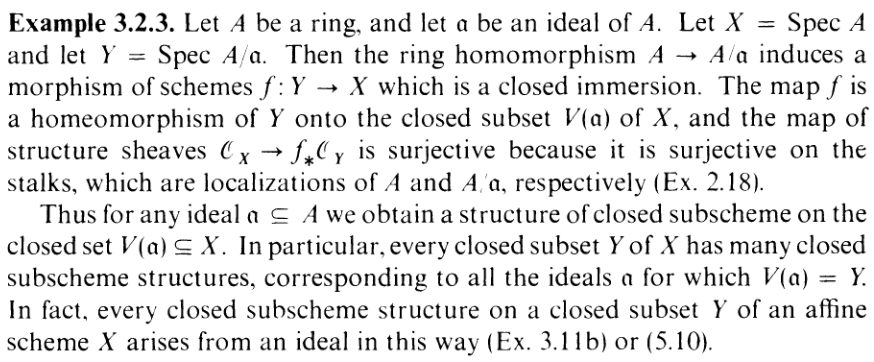
The reduced induced structure is the smallest of these structures (glued together):
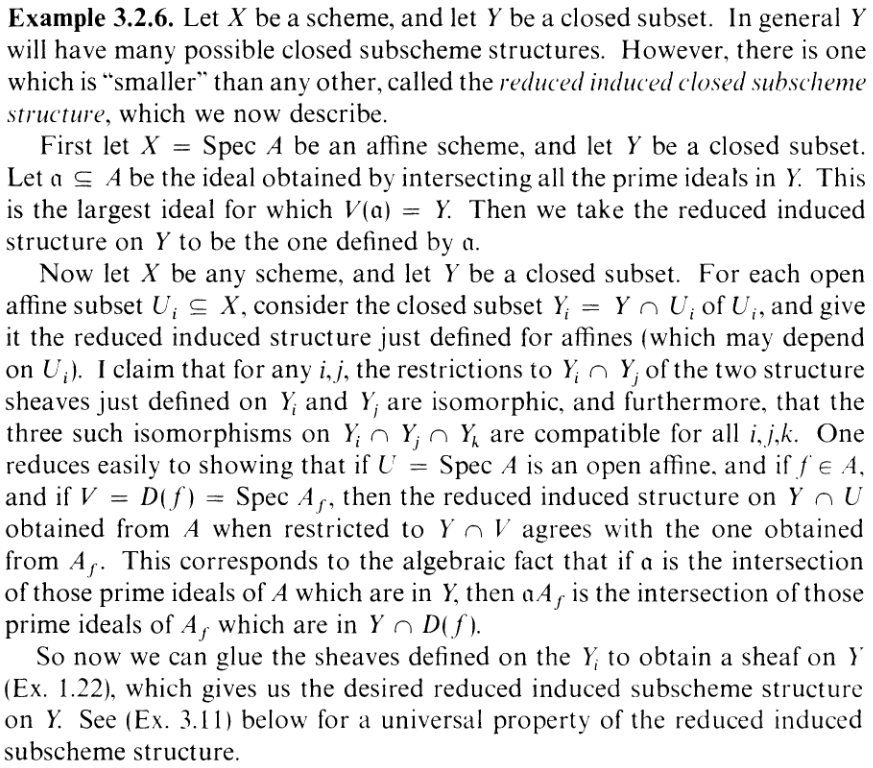
Ofc, the fact that it is the ”smallest” is what we’re showing here. Categorically:
”Smallest” means that it factors thru all other subscheme structures on it.
It’s initial. It’s a universal property baby. It’s easy to see that things glue here,
so we can reduce to affines:
Algebraically,
And the existence of the dashed morphism is obvious, since α ⊃ α′, by
construction. Done.
In fact, with α being the ”intersection of all the prime ideals” containing the
closed set, I know that α =
 . It is the radical of any other ideal that gives
the same closed set. In other words,
. It is the radical of any other ideal that gives
the same closed set. In other words,
0.0.3 Lemma
SpecA∕α is has the reduced induced structure ⇔ α is radical.
0.0.4 Trivial. QED
D

This is an extremely wordy explanation, so let’s draw it in diagrams.
0.0.5 The clean-shaven painter
Let us outline our master commutative diagram, for this part:
Y ′→ X is a an arbitrary closed subscheme (a closed immersion), and Y → X
is a closed subscheme we are constructing. Let’s paint it:
This exercise asks us to find the unique closed subscheme Y → X
such that we get red, and
given yellow, we get
green.
0.0.6 Getting red
Let’s attempt to construct Y . And taking a hint from Hartshorne, let’s
set Y = f(Z) as a set. And note, given an open cover Y = ⋃
iV i,
| f(Z) | = f(Z) ∩ Y | ||
| = f(Z) ∩⋃ iV i | |||
| = ⋃ if(Z) ∩ V i | |||
| = ⋃ if(Z) ∩ V i |
CAREFUL: That overline signifies the closure of f(Z) in Y . Let’s be more
specific:
| clY (f(Z)) ∩ V i | = clV i(f(Z) ∩ V i) |
Which is, simply, the closure of the restriction of f to f−1(V i) → V i. So we
can reduce to affines. We are looking at a morphism
 |
which is induced by a morphism
 |
And we let Y = f(Z) ⊂ X. Hence, we have a commutative diagram.
Now, of course, this begs the question: What is Y = f(Z) in the perspective
of this affine world? Well, it is a closed subset of SpecA, so what closed
subscheme structure should we give it? Presumably, f(Z) = V (α) for some
ideal α in A. What is α?
Well, we’re trying to catch f(Z). We want the image of Z = SpecB. I.e. we
want the union of f(P) = ϕ−1(P) for all the P ∈ SpecB. And V (α) is all
the prime ideals that contain α. So what’s a α that all the ϕ−1(P)’s contain,
without leaving room for too many extra ideals? (of course, we can leave some
room for extra ideals, because we’re catching f(Z), not f(Z)). Well, why not
just intersect em all?
 |
Huh? Is this even an ideal? Of course it is. Let
 |
be the nilradical of B. It is a (proper) ideal, so ϕ−1(𝒩B) is an ideal. But
 |
So ϕ−1(𝒩B) = α. Hence α is an ideal
Again, our goal is to verify this equality:
 |
So let P ∈f(Z). Now suppose P
 V (α), which means that P is in the open
neighborhood U = X − V (α). And since P ∈f(Z), we have that
V (α), which means that P is in the open
neighborhood U = X − V (α). And since P ∈f(Z), we have that
 |
I.e. there is a Q ∈ Z such that f(Q) ∈ U. And
| f(Q) ∈ U | ||
 f(Q) f(Q)
 V (α) V (α) | ||
 f(Q)⊅α f(Q)⊅α |
Which contradicts the definition of α. Hence f(Z) ⊂ V (α). Now for the reverse
inclusion.
Let P ∈ V (α), so P ⊃ α. Now suppose P
 f(Z). I.e. there is an open
neighborhood D(x) ∋ P such that
f(Z). I.e. there is an open
neighborhood D(x) ∋ P such that
 |
Then for all Q ∈ Z, we’d have that f(Q)
 D(x). i.e. f(Q) ∈ V (x). i.e.
D(x). i.e. f(Q) ∈ V (x). i.e.
| ∀Q ∈ Z : f(Q) ∋ x | ||
 ⋂
Q∈SpecBf(Q) ∋ x ⋂
Q∈SpecBf(Q) ∋ x | ||
 α ∋ x α ∋ x | ||
 P ∋ x P ∋ x |
which contradicts P ∈ D(x). Hence, f(Z) ⊃ V (α). So f(Z) = V (α). In
which case, 5 turns into
This all works out as set maps for obvious reasons, but to verify that this
diagrams works as morphisms of schemes, we need
And I shall construct δ in the manner that I am practically forced to. Wait,
doesn’t this sound familiar?
| δ : A∕α | → B | ||
| [x] |
 ϕ(x) ϕ(x) |
And we have to verify that it is well defined...
| [x] | = [y] | ||
 x − y x − y | ∈ α | ||
= ϕ−1(
 ) ) | |||
 ϕ(x − y) ϕ(x − y) | ∈
 | ||
 ∃n > 0 : (ϕ(x − y))n ∃n > 0 : (ϕ(x − y))n | = 0 |
And here we are, at a crucial point: To finish this off, I need to assume
Z = SpecB is reduced. In which case, I can write
| ϕ(x − y) | = 0 | ||
 ϕ(x) ϕ(x) | = ϕ(y) |
Thus allowing the map to be well-defined. And since we are assuming Z is
reduced, let’s check if we got the reduced induced structure on Y , i.e. that
 = α
(i.e. α is radical):
= α
(i.e. α is radical):
| xn | ∈ α | |||||
 ϕ(xn) ϕ(xn) | ∈
 | |||||
| = (0) | (B reduced) | |||||
 ϕ(xn) ϕ(xn) | = 0 | |||||
 ϕ(x)n ϕ(x)n | = 0 | |||||
 ϕ(x) ϕ(x) | = 0 | (B reduced) | ||||
 x x | ∈ ϕ−1((0)) | |||||
= ϕ−1(
 ) ) | ||||||
| = α |
So α is radical, and Y has the reduced induced structure.
0.0.7 yellow and green
Now that everything is affine, let’s verify all the properties check out,
(with the extra assumption that Z is reduced). Recall our drawing:
Which I shall now adapt algebraically. Ysee, since Y ′→ X is a closed
immersion, its corresponding ring morphism is surjective. And thus, given my
construction of Y , the corresponding diagram is
I.e. the problem is now the following painting:
GEOMETRY REDUCED TO ALGEBRA. AHHH, THE RING
O’ HARTSHORNED: I want to show that A∕α is a ring such that
we get red (which I already have), and given
yellow, we get green.
Now thanks to the surjectivity of h, the definition of g′ is forced by g. Since g
determines ϕ, which determines l, it all commutes. The uniqueness of A∕α
follows from C since Z, i.e. B is reduced. See figure 1.
0.0.8 If Z is not reduced?
Let’s bring up our drawing again:
If Z is not reduced, then my construction for Y doesn’t work, so
that dashed uncertainty remains dashed and uncertain. Now, there is a
version of Z that is reduced: Zred, as introduced in 2.3B. And if I had a
morphism Z → Zred, I can construct Y from Zred and factor through it:
This diagram would, more or less, complete the proof. Of course, we do not
have this situation, because we do not have a morphism Z → Zred. In 2.3B, we
constructed the opposite: A morphism Zred → Z, induced naturally from
A → A∕
 . If we wanted a morphism from Z → Zred, we’d have to make a
morphism
. If we wanted a morphism from Z → Zred, we’d have to make a
morphism
 |
Which is infeasible.
...Solution time? There are none. Everyone skips this part or gets it incorrect. I’m
not joking:
- Hartshorne’s exercise II.3.11 is surely an in-joke.
- Assumes Z → Zred, which, as I said, is completely wrong.
- Also assumes Z → Zred
- Finishes every part including the starred part b, but skips part d
- SOLVES IT... for a reduced scheme, which I already did
And, finally:
And thus, onto section 5.









